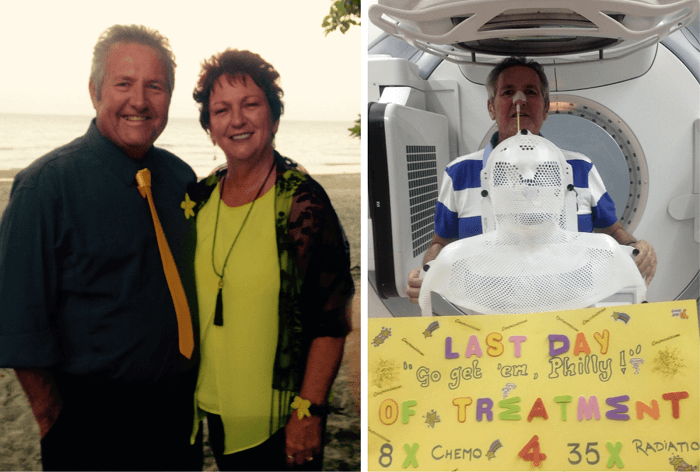
Phillip Wilson's story with throat cancer begins nine years ago, when he and his wife Susie had been travelling around Australia, living the best life.
During a trip to Bali, Phil thought he'd gotten a chicken bone caught in his throat. "That's what turned out to be cancer", he remembers, "and everything ended just like that. I was told I had six months to live and to get my affairs in order".
Phil is determined to help anyone experiencing cancer today, and their carers. Here, we cover three of Phil's insights. If you'd like to go deeper into Phil's personal experiences and the intimate details of his diagnosis, treatment and remission, you can visit Phil's personal blog.
1. Throat cancer treatment affects your ability to eat
During treatment, Phil had to be fed through a nasogastric tube for nine months. He went from 112kg down to 59kg. He also completely lost his sense of taste, as the radiation therapy caused damage to his tastebuds.
When Phil eventually started to regain his taste, he noticed some changes. First, he discovered the taste sensation umami, which was the first of his tastes to come back. He also found that some foods he used to love, like chili and tomato paste, now tasted sour and repulsive.
After having his nasogastric tube removed, Phil had to relearn how to eat. Phil recalls the importance of texture in his recovery, saying, "It helped me to identify which foods I could eat, and which ones would get stuck in my throat and cause me to choke."
Phil has found that foods that compress when chewed are more difficult to swallow without choking. This includes fresh bread, steak, and pork meat. By comparison, foods like fish, toasted bread, eggs, and vegetables tend to break apart when chewed and are easier to eat. However, Phil still must have fluids such as gravy with every meal to help food slide down his throat.
2. Your support system is incredibly important
One of the most helpful things for Phil during treatment and recovery was his support system. Phil recalls, "When you go through cancer, you've got to be careful to not isolate yourself, because it's a team effort."
Phil's wife, Susie, along with his daughter and step-daughters were constantly supporting Phil. Susie went to all of Phil's appointments, driving an hour to and from treatment. She also fed him breakfast, lunch and dinner, which included cleaning the nasogastric tube.
"I guarantee that, without Susie, I would definitely not have gotten through it. Your support network is essential," Phil adds.
Phil also had the amazing and surprising support of his cat, Pudddles. Phil experienced bad nightmares as a side effect of radiotherapy, which his doctor said was a normal experience. When Phil had these nightmares, Pudddles would notice him jittering or breathing more intensely, and would wake him up.
Phil recommends anyone going through cancer treatment to get a pet. "I'm not making this up. He could tell when I was sick and he could tell when I wasn't sick, and he's always watching me," Phil adds.
3. Take each day one at a time
To help manage himself through treatment, Phil learned the importance of patience and breaking down his days into smaller segments.
Phil would break down his days to morning, lunch time, and night to make himself feel closer to his goal of remission. On difficult days, he would even go hour to hour. Each day, he would remind himself, "I remember when I went through this yesterday," and then you can act on it, and slowly keep raising the bar.
During treatment, Phil had to learn how to be more patient. He remembers asking his doctor every week how he thought he was reacting to the treatment. The doctor would never tell Phil anything besides "let me look after that" which would infuriate Phil. Now Phil realises this doctor was trying to keep his mind off his treatment.
If you need to talk about cancer, call Cancer Council on 13 11 20.






